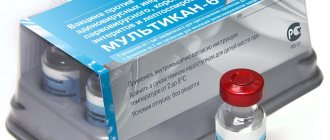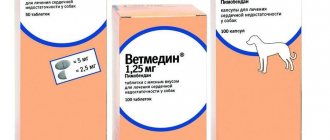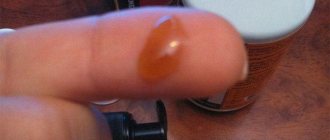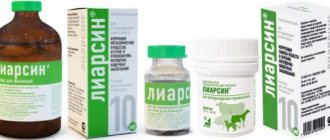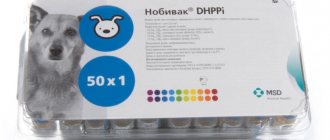Rimadyl for dogs is an excellent painkiller that causes both a lot of positive and negative responses, which, however, is quite typical for anti-inflammatory non-steroidal drugs.
But, nevertheless, if you put the results of treatment and the harm that it can cause on the scales, then the advantage will be in the direction of benefit. You just need to use Rimadyl strictly following the recommendations and prescriptions of your veterinarian.
Composition and release form Rimadyl P 100 mg (tablets)
Rimadyl R liver-flavored tablets are light brown tablets with the letter “R” embossed on one side of the tablet and a dividing groove on the other side, containing 20, 50 or 100 mg of carprofen as the active ingredient and auxiliary components: spray-dried pork liver powder, hydrolyzed vegetable protein, corn starch, confectioners' sugar, glucose syrup, gelatin (type A), magnesium stearate and lactose monohydrate. Packaged in plastic jars of 20, 30, 50, 60, 100 and 180 tablets.
What is Rimadyl used for?
If you are unsure why your veterinarian prescribed Rimadyl for your dog, the first thing you should do is call your veterinarian's office for clarification.
There are two main reasons why veterinarians prescribe Rimadyl to dogs.
- As part of a strategy for treating chronic pain in dogs with osteoarthritis
- As a post-operative drug for the treatment of pain and inflammation in dogs after surgery.
Rimadyl for dogs works in three ways:
- Treats inflammation
- Reduces fever
- Reduces pain
These qualities make it very effective in treating osteoarthritis. The anti-inflammatory properties of Rimadyl help reduce joint inflammation associated with osteoarthritis, which reduces pain, and the analgesic properties of the drug also reduce pain.
Because the drug is relatively well tolerated by most dogs, Rimadyl is a good choice for long-term pain relief for arthritis in dogs.
Veterinarians prescribe dogs to take Rimadyl for a short period of time after surgery for the same reasons. The drug reduces post-operative inflammation and also helps cope with acute pain, making the patient more comfortable.
Talk to your veterinarian about your dog's condition if you have any questions about why he or she prescribed Rimadyl.
Pharmacological properties
Rimadyl R , belonging to the group of non-steroidal anti-inflammatory drugs, has anti-inflammatory, analgesic and antipyretic effects. Carprofen, the active ingredient of Rimadyl R, in the arachidonic acid cycle primarily inhibits cycloxygenase-II, which is produced in the body in response to the development of inflammation. As a result, the synthesis of inflammatory prostaglandins, which cause inflammation, swelling and pain, is blocked. In therapeutic doses, carprofen has a much weaker effect on cycloxygenase-I, and therefore does not affect the synthesis of protective prostaglandins. Carprofen does not interfere with normal physiological processes in tissues, especially in the stomach, intestines, kidneys and platelets, is quickly absorbed from the gastrointestinal tract, reaches peak concentrations in the blood plasma 1 to 3 hours after administration, with a bioavailability of more than 90%. The half-life in dogs is approximately 8 hours. Carprofen is more than 99% bound to plasma proteins. The drug is metabolized in the liver, excreted in feces (about 80%), as well as in urine.
What is Rimadyl?
Rimadyl is one of the trade names of the veterinary drug carprofen. Carprofen belongs to a group of drugs called NSAIDs or non-steroidal anti-inflammatory drugs.
These drugs reduce inflammation with fewer negative side effects than steroids, making them more suitable than steroids for long-term use.
Carprofen is safer for dogs than human NSAIDs such as ibuprofen, naproxen or aspirin, which is why it is one of the most commonly prescribed veterinary pain medications.
This is why you should never treat your dog with pills from your own medicine cabinet, as many human medications can have serious consequences for dogs.
Rimadyl for dogs comes in three forms: capsules, chewable tablets and injections. Talk to your veterinarian about which method is best for your dog.
Buy Rimadyl for dogs
Doses and method of administration
Rimadyl liver-flavored tablets are used only internally. At the beginning of treatment, the daily dose is 4 mg of carprofen per 1 kg of body weight (for example, 1 Rimadyl R tablet containing 20 mg of carprofen per 5 kg of animal weight, 1 Rimadyl R tablet containing 100 mg of carprofen per 12.5 kg of animal weight or 1 tablet of Rimadyl R, containing 100 mg of carprofen, per 25 kg of animal weight). It is recommended to distribute the daily dose into two equal parts. After 7 days of treatment, depending on clinical indications, the daily dose can be reduced to 2 mg/kg body weight per day (1 tablet of 20 mg per 10 kg, 1 tablet of 100 mg per 25 kg or 1 tablet of 100 mg per 50 kg of animal weight) to 1. Introduction. The duration of therapy depends on the condition of the animal, but after 14 days of treatment the animal should be examined again by a veterinarian.
How do you know if your dog has an adverse reaction to Rimadyl?
Here are some symptoms to watch out for:
- Change in appetite
- Vomit
- Diarrhea
- Black, tarry, or bloody stools
- Changes in behavior (increased or decreased activity, changes in coordination, aggression)
- Increase or decrease alcohol consumption
- Urinary tract symptoms (changes in frequency, color, or odor of urine)
- Skin symptoms (scabbing, itching, or redness)
- Yellowing of the gums, skin, or whites of the eyes (jaundice)
If you notice any of these symptoms or any other changes in your dog, contact your veterinarian immediately. Side effects can be serious.
The sooner you catch them, the sooner your veterinarian can help your dog get back on track.
special instructions
Do not exceed the prescribed dose or duration of treatment. When using carprofen and warfarin simultaneously, the clinical situation must be carefully monitored, since both of these drugs bind to plasma proteins. During the procedure with Rimadyl R, you should follow the general rules of personal hygiene and safety precautions provided for when working with medicines. As with any medicine, wash your hands thoroughly with warm water and soap after handling. It is prohibited to consume food or water while working.
Storage conditions
With caution (list B) in a dry, dark place, out of reach of children, at a temperature of 0 to 25 ° C. Shelf life – 3 years.
Pros and cons of Rimadyl for dogs
The side effects associated with Rimadyl are serious, but it also has a negative impact on the quality of life of canine osteoarthritis. As an owner, you must weigh the pain associated with osteoarthritis against the relatively low risk of Rimadyl side effects.
Talk to your veterinarian about your concerns and let him know about any other medications your dog is taking, as well as any other conditions your veterinarian may not know about.
Buy Rimadyl for dogs
Purpose
Rimadyl is prescribed to prevent or block inflammation:
- with exacerbation of chronic diseases of the locomotor (musculoskeletal) system;
- with bursitis;
- osteoarthritis;
- injuries (fractures, dislocations, sprains, severe bruises);
- during the rehabilitation period after surgery on the musculoskeletal system.
The main purpose of using the medicine is to stop inflammation and relieve pain, so Rimadyl in the form of injections is prescribed as an analgesic, and for chronic diseases in the acute stage - to relieve symptoms. As a rule, the drug is prescribed as part of complex therapy aimed at eliminating the cause of the disease.
Joint diseases in dogs are often associated with increased activity. Among the diseases of the musculoskeletal system that cause many problems for animals and their owners:
| Arthrosis | It occurs as a result of “wear and tear” of the joints and subsequent destruction. It can be difficult to diagnose pathology at an early stage, which leads to an advanced form in which loss of limb function is possible. |
| Arthritis | Characterized by structural changes and inflammation of cartilage tissue. The animal is in severe pain and has difficulty moving. |
| Osteochondrosis | The disease is a violation of the mineral composition of cartilage tissue. The disease can be detected already in puppyhood, when the dog drags its paws and leans forward. As the animal grows, this leads to changes in the shape of the skeleton and lameness. |
| Joint dysplasia | A change in the anatomical shape of the joints, which cannot securely support the bone. Risk of developing other diseases. |
Most large breed dogs are at risk due to the high stress on their bones. Animals leading a sedentary lifestyle (living in city apartments) are characterized by a deficiency of vitamins and minerals, which lead to injuries and joint diseases. Veterinarians recommend the use of feed additives containing essential microelements and vitamins, and if a chronic disease develops, maintenance therapy is prescribed.
Recommendations for use
Follow these recommendations when treating with Rimadyl:
- try natural remedies and supplements first;
- Talk to your veterinarian about the risks and benefits of treatment;
- Tell your veterinarian about any medical conditions your pet has and any other medications you are taking;
- Ask your veterinarian to perform basic liver and kidney function tests before starting treatment;
- regularly monitor liver and kidney functions during treatment;
- The use of the drug for animals with kidney, liver and blood diseases, bleeding or gastrointestinal inflammation is not recommended;
- Avoid using the drug on pregnant or lactating dogs and puppies under 6 weeks of age.
In addition to monitoring kidney and liver function, blood tests, blood pressure and uric acid tests must be done during treatment.
Warning
Do not give other NSAIDs (such as Deramax) in combination with Rimadyl as this may increase the risk of stomach ulcers and bleeding.
Side effects
It is believed that the drug is well tolerated by animals, but in some cases nausea and vomiting, weakness, and a state of apathy may occur. The dog may experience constipation or, conversely, diarrhea, increased heart rate, and allergies in the form of rashes and redness that the dog may begin to scratch.
Therefore, when starting treatment with this drug, you need to carefully monitor your pet’s condition.
If side effects occur, treatment should be stopped, the dog should be given plenty of water to drink to avoid dehydration, and the pet should be taken to the vet immediately.
Alternatives to Rimadyl for Dogs
Rimadyl is one of the safest NSAIDs available for dogs, but there are alternatives if your dog has an adverse reaction. Talk to your veterinarian about prescribing an alternative pain reliever or alternative pain management strategies for your dog's osteoarthritis.
Your veterinarian is your best source of information about Rimadyl for dogs. Don't be afraid to ask any questions you may have, and make sure you give your dog the prescribed dose and follow your veterinarian's instructions.
Buy Rimadyl for dogs
Different breeds
Depending on what breed the pet is: large, medium or small, you need to calculate the exact dosage of the drug.
Insufficient intake of the active substance into the body will be ineffective in treating the disease, while an overdose can be fatal, especially for small breeds. Therefore, it is better to discuss this issue with a specialist.
Precautionary measures
It is not recommended to use different non-steroidal anti-inflammatory drugs (Rimadyl, analogues) at the same time. Also, nephrotoxic drugs should not be used earlier than 24 hours after consuming Rimadyl. Taking them together can lead to serious consequences for vital organs. It is very important to evaluate the condition of the heart and kidneys, as well as the liver, before the appointment. To do this, it is recommended to undergo a full examination and pass all the necessary tests. This is the only way you can protect your little friend from possible side effects. It is prohibited to use the drug on dogs bearing puppies, as this may adversely affect the health of the babies.
Analogues and prices
You can find a lot of anti-inflammatory drugs in veterinary pharmacies. But they cannot be used for self-medication. As an analogue of Rimadyl based on carprofen, we can name Remkal, Norocarp.
If there are contraindications to the use of Rimadyl, the veterinarian may prescribe Movalis, Trocoxil, Previcox.
The medicine is sold in veterinary pharmacies; the cost of Rimadyl depends on the form (solution or tablets) and dosage (for tablets).
On average, the price of a 20 ml solution costs 1700-3000 rubles,
20 tablets of 20 mg – 450-500 rubles, with a higher concentration of carprofen in tablets, the cost increases.
Indications for use
Rimadyl is used to treat the joint pathology of our four-legged friends:
- for the purpose of relieving pain during inflammation of the periarticular bursa and other types of similar diseases;
- for chronic joint pathologies;
- as a means for pain relief after surgery, etc.
The drug also works well for acute inflammation in the joints, joint injuries, fractures, and for the treatment of acute osteoarthritis. But you should know that in case of chronic pathologies, the remedy only temporarily alleviates the condition, but does not have a therapeutic effect.
Reviews
Vet
Olga, veterinarian : “I believe that Rimadyl is a fairly effective drug for the treatment of diseases of the musculoskeletal system in dogs. With the correct dosage, it is well tolerated and in tablet form can be used for long-term therapy.
However, in order to avoid side effects, you need to first examine your pet for internal diseases and a tendency to allergic reactions.”
Owners
Alexander, 38 years old, Kaluga : “I often go fishing with my Staffordshire Terrier, some time ago he jumped unsuccessfully and injured his hind leg. They put a splint on me and prescribed Rimadyl injections.
My wife is a doctor by profession and did the injections themselves. We noticed that after the injection the dog feels better, the pain goes away, and his appetite appears. Our pet recovered quite quickly, most likely this drug helped.”
Alexander, 27 years old, Murmansk : “My wife’s miniature pinscher twisted his paw, and he was prescribed Rimadyl tablets. Perhaps the dosage was calculated incorrectly or he was intolerant to the drug, but literally after 2 hours he began to itch all over, drank all the water in the bowl, and then developed severe diarrhea.
The doctor immediately canceled the treatment. Therefore, I cannot say that this drug is suitable for all dogs.”
Safety precautions
Rimadyl contains highly active components. When interacting with it, it is advisable to take personal precautions:
- wear disposable gloves;
- do not drink or eat during the procedure;
- Wash your hands when finished.
If the injection solution accidentally gets on the mucous membranes, rinse them with plenty of water.
Andrey, Moscow
“I have been working as a veterinarian for more than fifteen years. I prescribe Rimadyl to relieve inflammation, swelling after surgery and for joint diseases. The drug is strong, so if treated incorrectly there can be serious complications or an overdose. I have heard about fatal cases, but in my experience this has never happened. I always tell animal owners in detail what to do in case of unwanted reactions. Remember that these are not vitamins, you need to be careful!”
Zhanna, Nizhny Novgorod
“My dog had a severe attack of polyarthritis. In addition to other medications, the veterinarian prescribed this drug. He warned about possible complications and said that Rimadyl should only be given after meals. Honestly, after the negative reviews, it was scary to treat the dog with this medicine. But I did everything according to the instructions, and the pet went through everything without any problems.”
general description
For convenient and effective use, the manufacturer produces the drug in two versions - tablets and injection solution. Injections are more suitable for relieving severe pain and emergency treatment for injuries, and tablets are usually used to treat chronic pathologies.
Rikarf injection solution is a clear, pale yellow liquid, the main component of which is carprofen. The medicinal liquid is packaged in bottles made of dark glass. The capacity of each bottle is 20 ml.
Note! The solution should be stored in the refrigerator (at a temperature of 2 to 8˚C). After opening the bottle, the drug can only be used for 4 weeks, and then must be disposed of
The dark brown Rikarf tablet has a heterogeneous structure and contains dark inclusions. On one side there is a line, which makes it possible to divide the tablet into equal parts. The content of carprofen in one tablet can be 20, 50 and 100 mg, although the drug with the highest concentration is rarely found in pharmacies due to low demand.
In addition to a number of auxiliary components, the composition includes a flavoring agent that gives the tablets a meat aroma.
Active substance
Each medicine has several names:
- trade
- international nonproprietary (INN) or grouping, or chemical
Trade name
unique for each manufacturer. It is necessary to distinguish drugs from different manufacturers.
Example of trade names of drugs containing the active substance ibuprofen:
- Dolgit
- Nurofen
- Ibuprofen-Akrikhin
- Faspik
- Mig and others
INN
is the name of the active substance.
An example of an active substance and a preparation containing it:
- ibuprofen (Nurofen, Mig)
- doxycycline (Unidox Solutab, Doxylan)
- acetylsalicylic acid (Aspirin, Upsarin UPSA)
Group name
assigned to a medicinal product if it does not have an INN or several of them.
Examples of group names:
- chondroitin sulfate
- tolperisone + lidocaine
- cod liver oil
Chemical name
- the name of the active substance, reflecting its composition and chemical structure.
The doctor must write a prescription in Latin using the INN. If there is no INN, the prescription is written by generic or chemical name. The drug is prescribed by its trade name if it does not have an INN, generic or chemical name.
The pharmacy employee offers you medications with the active ingredient that the doctor indicated in the prescription. Drugs with the same active ingredient can be produced by different factories. In this case, they will have different trade names.
Analogs must have equivalent active ingredients. To find a drug, use the service for selecting analogues by INN.
Limitations and possible consequences
Rimadyl is considered a safe drug for dogs, but has restrictions on its use. The medicine is not prescribed:
- for chronic diseases of the heart, liver, kidneys;
- in case of circulatory disorders;
- in case of dysfunction of the digestive system, including gastritis;
- during pregnancy, lactation;
- at an early age (up to one year);
- in case of individual intolerance to the components.
The veterinarian should be informed about the presence of these pathologies or the use of any medications during examination. Rimadyl is not prescribed if animals are predisposed to allergic reactions or if they are planning mating in the near future.
Important! The medicine should not be given with other anti-inflammatory or nephrotoxic drugs.
If the dosage is violated, self-medication and there are prohibitions on taking carprofen, negative reactions are possible:
- lack of appetite, complete refusal to eat;
- nausea, vomiting;
- increased thirst;
- diarrhea with bloody discharge;
- yellowing of the skin, sclera of the eyes;
- frequent urination;
- skin reactions - redness, ulceration;
- change in behavior: aggression, tremors, lack of coordination of movements.
Brief instructions for choosing analogue drugs:
- Analogs must have equivalent active ingredients. To find a drug, use the service for selecting analogues by INN.
- The dosage of the analogue should be either the same or less. If the dosage is less, the medication regimen changes.
- The packaging of analogues may differ. Before purchasing, calculate how much of the drug is needed for the course of treatment.
- Analogs must have the same dosage form and route of administration. That is, you should not buy tablets instead of suppositories.
- Keep in mind that not all generic drugs are equally similar to the original drug.
- Do not replace the medicine with a dietary supplement.
Read more below.


